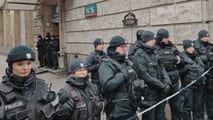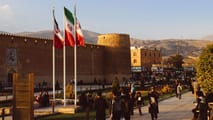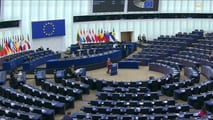ECLJ Pleased Council of Europe Stands for Persecuted Oriental Christians
(Strasbourg, France) - The European Centre for Law and Justice (ECLJ) warmly welcomes the adoption by the Parliamentary Assembly of the Council of Europe of a Recommendation on “Violence against Christians in the Middle East”. This Recommendation and its explanatory memorandum (Doc. 12493) have been drafted by Mr Luca Volontè (Italian MP President of the EPP Group) and adopted by 125 votes against 9 and 13 abstentions.
The ECLJ is pleased that the suggestions it formulated during the hearing it organised on January 25th have been fully endorsed by the Parliamentary Assembly Recommendation.
This Recommendation expresses a strong commitment of Europe to defend the Christians in the Middle East and other regions where they are persecuted. The Parliamentary Assembly not only condemns the tragic terrorist attacks that happened recently in Baghdad and in Alexandria, but also addresses the “anti-Christian stereotypes and bias as well as Christianophobia in general”, i.e. the rising worldwide anti-Christian intolerance. During the debates the Assembly has strongly denounced the religious cleansing of the Christians from their native region. The “dhimmi” status which under Sharia law relegates the Christians as second class citizen has also be condemned without ambiguity.
From a broader point of view, some Members of the Assembly have underlined that it is also a kind of violence against the Christians to negate Christianity from the European culture. The communist regimes persecuted the Christians and still do in North-Korea, as Islamism does nowadays, but it was recalled that the secularist ideology also discriminates against religions, at a different level. The Europeans should be consistent in this regard.
The best achievement of this Recommendation is without doubts not to be limited to weak and empty wordings, but to contain a list of clear and precise political actions that have to be undertaken by the Council of Europe and its 47 Member States, among which:
- develop a permanent capacity to monitor the situation of governmental and societal restrictions on religious freedom and related rights in Council of Europe member States and in states in the Middle East, and report periodically to the Assembly;
- pay increased attention to the subject of freedom of religion or belief and to the situation of religious communities, including Christians, in its co-operation with third countries as well as in human rights reports.
- develop a comprehensive policy of asylum based on religion, which would acknowledge in particular the specific situation of converts;
- promote policies to help relocate Christian refugees in their home countries and support communities offering a local refuge to the Christian minorities of the Middle East.
The Assembly has also urged all States in the Middle East to, among others, condemn unequivocally deadly attacks on innocent people, as well as all forms of discrimination and intolerance based on religion and beliefs and to promote positive education about religions, including Christian minorities.
As a background, this debate took place two days after a hearing organised during the Parliamentary Assembly session on “The Persecution of Oriental Christians, what answer from Europe?” This hearing, organised by the ECLJ with the Rapporteur Luca Volontè (EPP) gathered more than 220 people around, among others, Mgr Antoine Audo, Chaldean Bishop of Aleppo, Archimandrite Emanuel Youkhanna, of the Assyrian Church of the East, and Prof. Massimo Introvigne, OSCE Representative on intolerance and discrimination against Christians. The speakers called on the Council of Europe and its member States to commit themselves to defending the Oriental Christians. On this occasion, the ECLJ released its report “The Persecution of Oriental Christians, what answer from Europe?” which addresses the situation of Christians in the Middle East countries and suggests specific measures to help them. The ECLJ is pleased that the recommendations expressed in its report and during the hearing have been fully endorsed by the Parliamentary Assembly Recommendation.
This Recommendation follows the adoption of a resolution by the European Parliament last January 20th, and will be followed by a discussion within the European Council (Brussels) next Monday January 31st, at the initiative of the governments of Italy, Hungary and Poland.
The ECLJ will very closely follow up and support the implementation of this Recommendation.
“If Christianity is blotted out of the Middle Eastern region, not only will those societies suffer for lack of diversity and charity, but the intolerance for any minority religion will become iron-clad. We are pleased that the Council of Europe comes to the defence of the indigenous Christians wherever they are discriminated against or persecuted. We must refuse the strategy of religious tension brought by extremists,” recalls Dr Grégor Puppinck, Director of the ECLJ.
Sadly, some MPs from Turkey and Azerbaijan have voted against it, as well as the Swiss socialist Andreas GROSS. (Voting result)
Related documents:
- Draft Recommendation “Violence against Christians in the Middle East” (Doc. 12493) as adopted by the committee on 25 January 2011. - Non definitive version of the text. The definitive version of the text will be available on the website of the PACE.
- European Parliament resolution of 20 January 2011 on the situation of Christians in the context of freedom of religion
- ECLJ report “The Persecution of Oriental Christians, what answer from Europe?”
The European Centre for Law and Justice is an international, Non-Governmental Organization dedicated to the promotion and protection of human rights in Europe and worldwide. The ECLJ holds special Consultative Status before the United Nations/ECOSOC since 2007.
The ECLJ engages legal, legislative, and cultural issues by implementing an effective strategy of advocacy, education, and litigation. The ECLJ advocates in particular the protection of religious freedoms and the dignity of the person with the European Court of Human Rights and the other mechanisms afforded by the United Nations, the Council of Europe, the European Parliament, the Organization for Security and Cooperation in Europe (OSCE), and others.
The ECLJ bases its action on “the spiritual and moral values which are the common heritage of European peoples and the true source of individual freedom, political liberty and the rule of law, principles which form the basis of all genuine democracy” (Preamble of the Statute of the Council of Europe).









